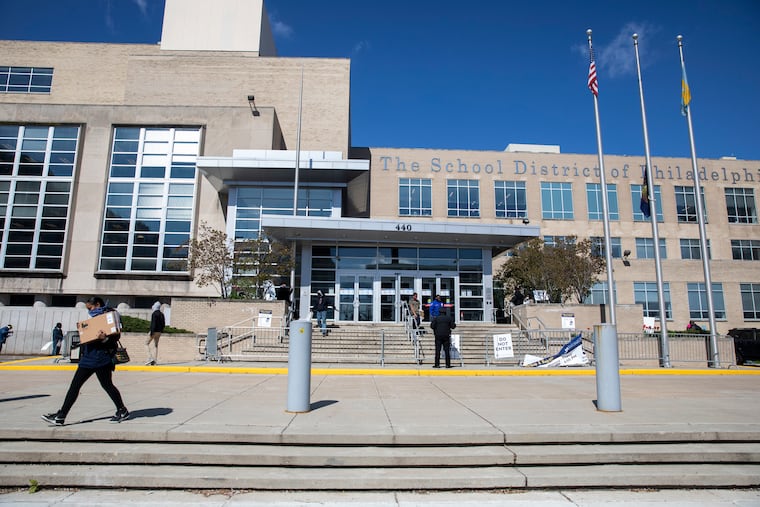Philadelphia and its school district have settled a lawsuit over school-building safety and oversight
An environmental oversight panel will be created, but the district retains final say-so over whether buildings can open.

The Philadelphia School District and city have settled a lawsuit challenging a law that would have given the city more environmental oversight over school buildings — and the ultimate authority to decide whether they can open.
The school system has agreed to drop its lawsuit, and the city prevailed on the creation of an advisory panel to examine district environmental issues. But the district retains final say-so on whether schools can open, and will get an additional $2.5 million in city money to address data management issues around asbestos, lead and other environmental hazards.
City and district leaders praised the settlement, announced Wednesday afternoon, hailing it as a way to move forward with one voice. The lawsuit, filed in January in federal court, was an unprecedented move by the school board against the authority that created it and chooses its members.
In the last school year, six district schools and two district-owned charter school buildings were forced to close because of damaged asbestos, and district officials acknowledged that toxins had been erroneously categorized as safe in an unknown number of schools across the city for years. The school system’s inspector general is investigating.
» READ MORE: Philly schools are suing the city over a law it says could keep buildings from opening in the fall
But the two sides struck a conciliatory tone Wednesday.
“The resolution of this lawsuit reflects the city and school district’s shared priority of maintaining safe and healthy schools for students and staff while minimizing learning disruptions due to building closures,” Mayor Jim Kenney said in a statement. “The city is grateful to our partners in public health and education for their collaboration in reaching this agreement. This is a significant step forward in enhancing efficiency and transparency in school facility inspections.”
School board president Reginald Streater said the settlement “provides more clarity around how schools will remain open and how the city’s ordinance will be implemented.”
As part of the settlement, the district agreed to increased transparency and timely disclosures to the public.
» READ MORE: Philly schools are ramping up asbestos work but are three years away from meeting federal requirements
Federal law mandates asbestos inspections of every building every three years, and six-month surveillance examinations of buildings where asbestos has been found. Because of resources and staff capacity, the district has historically been behind on its inspection schedule, but it has stepped up efforts recently.
Officials finished their current three-year inspection schedule in July, and committed in the settlement to meeting the six-month inspection schedule by August 2024.
The district will also post the results of those six-month inspections “as expeditiously as possible,” and will aim to disclose them within 90 days of the inspection’s conclusion. It often fails to meet that timeline now.
How will the settlement impact Philly schools?
The $2.5 million the city agreed to pay the school district will go to help the district pay for its “significant investment in technology that is intended, in part, to improve management, storage, tracking and use of data related to asbestos, as well as to improve the transparency of the asbestos inspection program, including by reducing the amount of time needed to prepare final reports for public posting.”
Though it’s a one-time allocation above and beyond city funding already promised to the district, the settlement suggests more money might be forthcoming in future years, depending on the school system’s progress.
The facilities advisory board has not yet been named, but will comprise environmental experts, representatives from the district, City Council, Philadelphia Federation of Teachers, and other unions, parent groups, and students under the terms of the 2022 city law.The law had empowered the board to have broad authority to make recommendations to the city’s managing director whether schools should open or not; under the terms of the settlement, the district retains the authority to decide whether school buildings are safe to educate children.
Streater had called the lawsuit a “family dispute,” and said in an interview Wednesday that its resolution was the result of five months of good-faith negotiations on both sides. (Lawyer Mark Aronchick helped mediate the settlement.)
“I’m happy that we were able to come together for our students and move past this dispute for our students,” Streater said. “This is the next natural step of a sustainable and collaborative relationship with the city and all other interested stakeholders.”
City Solicitor Diana Cortes said her department’s priorities “were transparency and assurance that youth are able to attend school safely and consistently. We are confident that this outcome in partnership with the school district will achieve just that.”
The settlement does not address a separate issue: City Councilmember Isaiah Thomas’ call for an independent authority to take over bonding and management of all district repair and new construction projects. A hearing was held on that topic Wednesday.
Testifying at the hearing, Streater and Philadelphia Schools Superintendent Tony B. Watlington Sr. indicated that while they took no official position on the authority, they acknowledged the district cannot tackle its massive facilities issues alone.
“School building authorities have seen success where they are adequately and thoughtfully funded,” Watlington said.